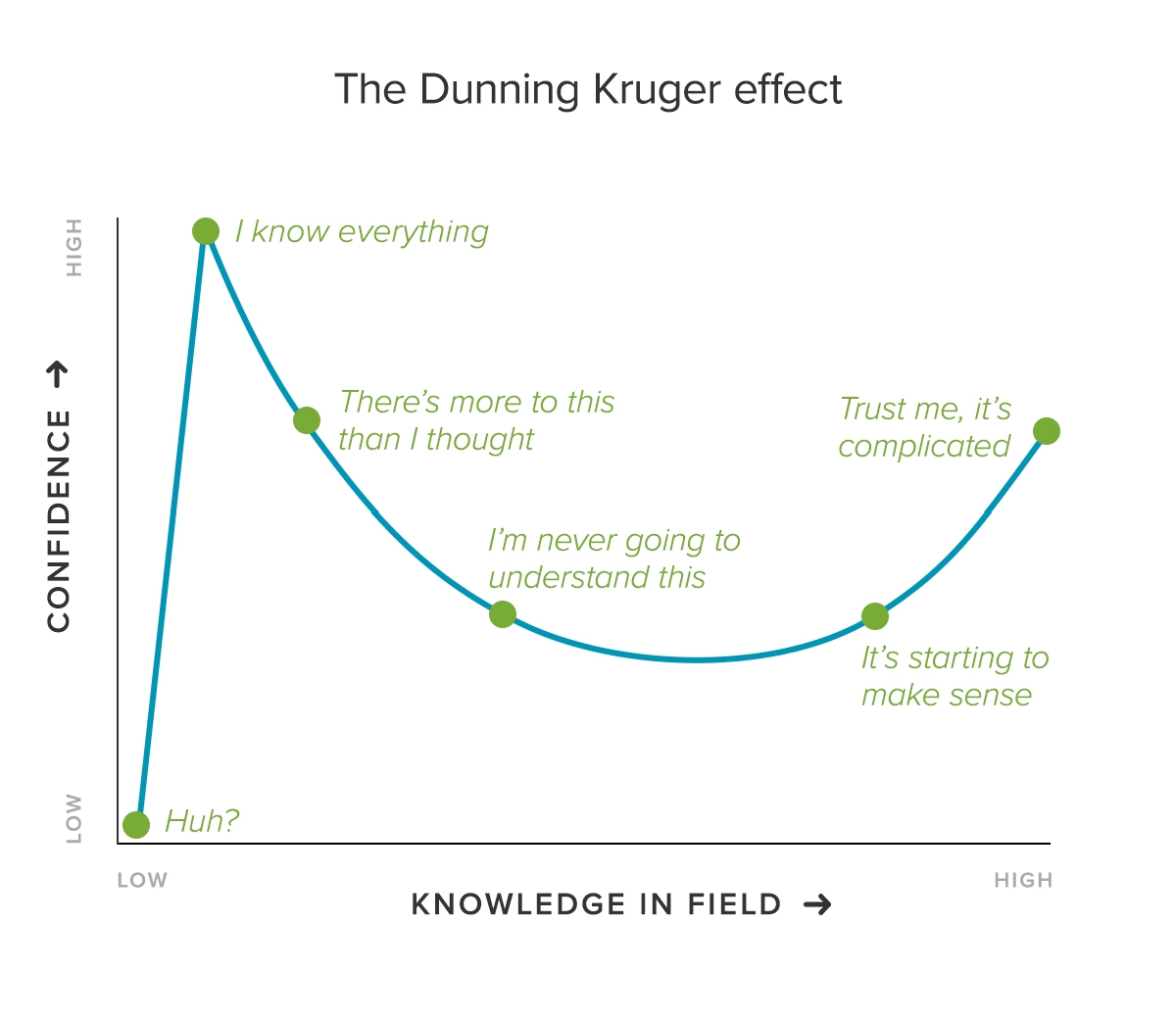The Dunning-Kruger Effect: Why Ignorance and Overconfidence Go Hand in Hand

Have you ever encountered someone who thought they were a master of a skill despite their obvious lack of knowledge?
Or perhaps you've found yourself underestimating your own abilities in a particular area, assuming that everyone else finds it just as effortless as you do.
Welcome to the intriguing world of the Dunning-Kruger Effect, a cognitive bias that sheds light on our tendency to overestimate our competence while simultaneously lacking self-awareness about our limitations.

Understanding the Effect:
The Dunning-Kruger Effect manifests when individuals lacking expertise in a certain domain mistakenly believe they possess superior skills. Conversely, those who excel in a specific field tend to underestimate their abilities, assuming that the task is equally simple for everyone else. This bias can be found in various contexts, influencing our decision-making processes and ultimately shaping our perception of ourselves and others.
Individual Implications:
The Dunning-Kruger Effect can have profound implications on an individual level. It may lead you to overlook your own areas of expertise, preventing you from recognizing your unique talents. Furthermore, when you excel at something that challenges you, you might mistakenly assume that it is your true calling, when in fact you may be approaching average performance levels.
Recognizing this effect enables you to discern when to trust your own abilities and when to seek objective advice from others. It also highlights the importance of avoiding disappointment when your self-perceived talents go unrecognized by others. By understanding the Dunning-Kruger Effect, you can navigate your personal journey with more clarity and make informed choices about the opportunities and careers you pursue.
Here are three examples of the individual implications of the Dunning-Kruger Effect:
- Social Implication: Imagine you're at a social gathering, and a heated debate on a complex political issue arises. You might witness individuals with limited knowledge confidently expressing their opinions as if they were experts. This overconfidence can lead to misinformation being spread and can hinder meaningful discussions.
Recognizing the Dunning-Kruger Effect allows you to approach such situations with humility and encourages you to seek out reliable information and different perspectives before forming your own opinion. - Professional Implication: In the professional realm, the Dunning-Kruger Effect can impact decision-making and career progression. Someone with limited skills and knowledge may overestimate their competence, leading them to take on tasks or responsibilities beyond their capabilities.
This can result in poor performance, missed opportunities for growth, and potential setbacks in their career. By understanding this effect, individuals can better assess their skills, seek appropriate training or mentorship, and make informed career choices that align with their abilities. - Psychological Implication: On a psychological level, the Dunning-Kruger Effect can influence self-perception and self-esteem. Individuals who excel in one area may mistakenly assume they possess exceptional abilities across all domains. Conversely, those who struggle with certain skills may underestimate their overall competence and feel inadequate. This can create imbalances in self-confidence and hinder personal development.
Being aware of the Dunning-Kruger Effect helps individuals maintain a realistic perspective of their strengths and weaknesses, fostering healthier self-esteem and encouraging targeted efforts for self-improvement.
Reflecting on these examples and considering how the Dunning-Kruger Effect manifests in various aspects of your life can provide valuable insights for personal growth and decision-making. Remember, embracing self-awareness and seeking reliable information are key to navigating the complexities of this cognitive bias.
Societal Implications:
The impact of the Dunning-Kruger Effect extends beyond individuals and permeates society as a whole. When individuals lacking knowledge and skills believe they are experts, they often assume a position of influence, spreading misinformation and reinforcing ill-informed views. On the other hand, those with exceptional abilities may underestimate themselves, failing to share their expertise and missing opportunities for teaching and growth.
This phenomenon is especially relevant in our democratic society, where uninformed individuals can be the most confident and influential. This asymmetry of knowledge contributes to the proliferation of misinformation and hampers the learning opportunities we could gain from genuine experts. Recognizing the Dunning-Kruger Effect enables us to question the sources of information we trust, ensuring that we prioritize credibility overconfidence.
Avoiding the Effect:
Step 1: Develop self-awareness and a willingness to learn from others.
Step 2: Engage in honest comparisons with peers to gain insights into your own performance and recognize your true abilities.
Step 3: Avoid underestimating your skills by acknowledging when you excel at something that challenges you.
Step 4: Don't miss opportunities to teach and share knowledge by assuming you are only average when you actually have exceptional abilities.
Step 5: Embrace feedback, even if it's challenging, to overcome blind spots and improve your skills.
Step 6: Remember the proverb: "When arguing with a fool, first make sure the other person isn't doing the same thing."
Step 7: Cultivate humility and a willingness to learn, especially when discussing or debating.
Step 8: Recognize that there is always room for growth and further learning, even if you believe you are exceptional at something.
By following these steps, you can navigate the complexities of the Dunning-Kruger Effect more effectively and foster personal growth and improvement.
The Dunning-Kruger Effect shines a light on our human tendency to overestimate our competence while remaining oblivious to our limitations. By understanding this phenomenon, we can avoid the pitfalls of ignorance and overconfidence and embark on a path of continuous learning and personal growth.
Embracing self-awareness, seeking feedback, and remaining open to the expertise of others will empower us to navigate our journeys with greater wisdom and clarity.
Reflect on your own experiences and consider how the Dunning-Kruger Effect may have influenced your perceptions and decisions. Challenge yourself to remain curious, humble, and open-minded, allowing genuine expertise to flourish and supporting the spread of accurate knowledge within your spheres of influence.
Remember, in the pursuit of knowledge and personal development, acknowledging what we don't know can be just as important as recognizing what we do know.
As Oscar Wilde wisely said, "I am not young enough to know everything."
Here are three reflection questions to help readers delve deeper into their own lives and examine the Dunning-Kruger Effect:
Reflection Question 1: In what areas of your life do you find yourself overestimating or underestimating your abilities? How might these biases be influencing your decisions and opportunities for growth?
Reflection Question 2: Think about a recent situation where you received feedback or constructive criticism. How did you initially react? Did you dismiss or embrace the feedback? Reflect on how your response aligns with the Dunning-Kruger Effect and consider how a more open and humble approach could enhance your personal development.
Reflection Question 3: Are there instances in your social or professional circles where you've observed the Dunning-Kruger Effect in action? How does this impact the dynamics of those interactions and the exchange of knowledge? Reflect on how being aware of this bias can help you navigate such situations with greater insight and understanding.